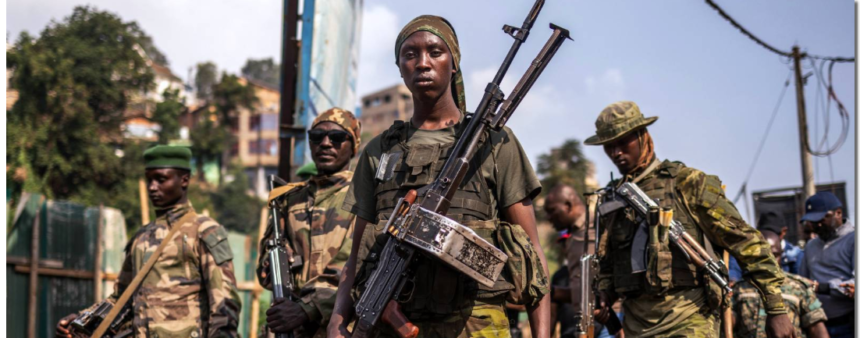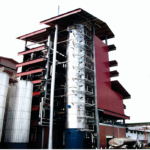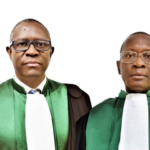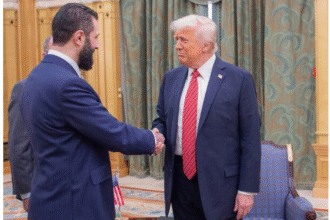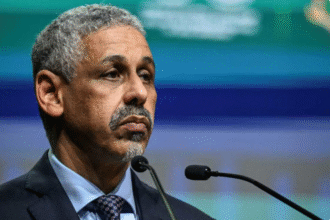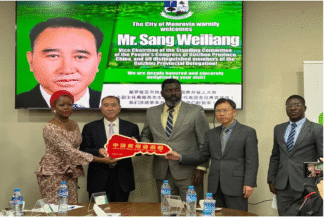By Patrice Katuma
North Kivu, DRC – While the Democratic Republic of Congo (DRC) and Rwanda have submitted their contributions to a preliminary peace agreement brokered by the United States, fighting continues to rage in eastern Congo, threatening to undermine the fragile diplomatic progress.
According to local sources in North Kivu, the M23 rebel group has seized control of Lunyasenge, a town located on the western shore of Lake Edouard in Lubero territory. This latest offensive places other strategic locations, including Uvira in South Kivu, Kalemie in the Greater Katanga, and Kisangani in Tshopo, within the rebels’ sights.
This escalation is a clear violation of the ceasefire agreed to in mid-April in Doha, Qatar, between the AFC/M23 and Congolese government representatives. Reports indicate that the current fighting involves the M23 battling against the Wazalendo, a local rebel group aligned with the Congolese army. The Wazalendo is primarily composed of farmers from Kivu communities who have taken up arms after their lands were seized by the M23.
“After their region was conquered by the M23, they went into hiding in the bush and started carrying out raids. That’s why the fighting didn’t really stop,” explained Nicaise Kibel Bel, a security expert based in the region.
The Congolese army has responded to the renewed violence, stating that it “reserves the right to retaliate on all fronts if the rebel threat persists.” Colonel Mak Hazukay, army spokesman in the Far North, denounced the M23’s actions as a “flagrant violation of the ceasefire and of all the measures taken to follow up the negotiations under way in Doha in Qatar and Washington in the United States.”
Adding further complexity to the situation, AFC/M23 leader Corneille Nangaa has declared that the group’s ultimate objective is to reach Kinshasa, the DRC’s capital, before a ceasefire can be enacted. “The word ceasefire was born in Kinshasa and will be buried there,” he said, adding that the Congolese people are disillusioned with President Tshisekedi’s leadership.
US-Backed Peace Deal Offers Hope Amidst Violence
Despite the ongoing conflict, the United States has welcomed the submission of the preliminary peace agreement by both the DRC and Rwanda, a key provision of the US-backed Declaration of Principles signed in Washington.
“I welcome the draft peace proposal received from the DRC and Rwanda,” stated Massad Boulos, Senior Africa Adviser at the US State Department. “It is an important step towards meeting the commitments made in the Declaration of Principles, and I look forward to their continued commitment to peace.”
The Congolese government, through spokesman Patrick Muyaya, echoed this sentiment, highlighting the agreement as an important step towards “talking about development” and reiterated their commitment to peace.
Rwanda’s Foreign Minister, Olivier Nduhungirehe, expressed optimism, stating his hope that “everything will go well, [and] we will have a peace agreement that will enable us to achieve lasting peace in the region.”
The Washington peace process outlines a clear timetable, with the foreign ministers of Rwanda and the DRC scheduled to meet in the third week of May to finalize the draft agreement. A signing ceremony, potentially involving President Donald Trump and the heads of state of both Rwanda and the DRC, along with representatives from Qatar, Togo, Kenya, and Zimbabwe, is tentatively planned for mid-June at the White House.
Whether this US-backed initiative can overcome the ongoing violence and deep-seated mistrust remains to be seen, but it stands as a crucial effort to bring lasting peace and stability to the war-torn eastern region of the Democratic Republic of Congo.


